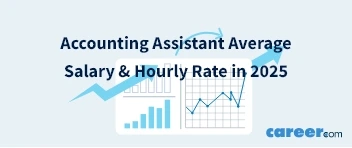Senior Benefits Analyst Average Salary and Hourly Rate in 2025

A senior benefits analyst, also known as a compensation and benefits manager, typically plans, develops, and manages employee benefits programs. They oversee the entire implementation and procedures of the compensation program. Senior benefits analysts also guide the HR department by suggesting improvements and ensuring compliance with the programs.
Moreover, they also evaluate job position descriptions to determine crucial details such as classification and salary. In 2025, senior benefits analysts earn an average annual salary of $92,500 or $46 per hour. Keep in mind that senior benefits analyst salaries may vary depending on key factors such as education level, experience, geographic location, skills, and demand.
In the following sections, this guide will provide an overview of senior benefits analysts' pay and a detailed outline of their job responsibilities, job outlook, and career trends for the coming years.
An Overview of Senior Benefits Analyst Salaries
The average salary for senior benefits analysts in the United States as of April 7, 2025, is $92,500 per year. The salary range for senior benefits analysts typically falls between $73,969 to $107,975, according to the latest data from Salary.com.
| Percentile | Average Annual Salary |
|---|---|
| 10th Percentile | $73,969 |
| 25th Percentile | $82,800 |
| 50th Percentile (Median) | $92,500 |
| 75th Percentile | $100,600 |
| 90th Percentile | $107,975 |
The U.S. Bureau of Labor Statistics (BLS) also reports that salaries for senior benefits analysts vary depending on which industries they work in. For instance, senior benefits analysts working for professional, scientific, and technical services can earn up to $81,790, while those working on healthcare and social assistance can only earn about $64,330.
| Industry | Average Salary |
|---|---|
| Professional, scientific, and technical services | $81,790 |
| Management of companies and enterprises | $78,830 |
| Local government, excluding education and hospitals | $78,270 |
| Insurance carriers and related activities | $69,330 |
| Healthcare and social assistance | $64,330 |
Senior Benefits Analyst Salary: Hourly, Weekly, Monthly, and Yearly Breakdown
The average senior benefits analyst’s pay can be broken down into hourly, weekly, monthly, and yearly amounts. According to Salary.com, the average rate for a senior benefits analyst in the United States is $44 per hour or $8,937 per month.
- Average salary per hour: $44
- Average salary per week: $1,779
- Average salary per month: $7,708
- Average salary per year: $92,500
As previously noted, senior benefits analysts in the United States will find that their salary may vary due to key factors such as geographic location, years of experience, and education. These factors will be explored in detail below.
How Experience Impacts Senior Benefits Analyst Salaries
Aside from their educational background, certifications, and accreditations, senior benefits analysts with higher levels of experience earn more than their peers most of the time. As shown in the list below, there are notable salary differences across various experience levels of senior benefits analysts in the United States.
Based on the Salary.com data, the difference between entry-level senior benefits analyst salaries and expert-level senior benefits analyst salaries is $7,970. This also shows a significant gap between the intermediate-level senior benefits analyst salaries and specialist-level senior benefits analyst salaries, with $88,881 and $93,346, respectively.
- Entry-Level Senior Benefits Analyst: $88,157
- Intermediate-Level Senior Benefits Analyst: $88,881
- Senior-Level Senior Benefits Analyst: $90,328
- Specialist-Level Senior Benefits Analyst: $93,346
- Expert-Level Senior Benefits Analyst: $96,127
State-by-State Breakdown of Average Salaries for Senior Benefits Analysts
It can also be noted that each US state has different average salaries for senior benefits analysts due to several factors such as cost of living, industry performance, and demand.
Based on the Salary.com data, the District of Columbia offers the highest senior benefits analyst income in the United States at $103,000. The next ones are California and New Jersey with $102,100 and $101,400 per year, respectively. On the other hand, Mississippi has the lowest pay with $82,500.
| State | Average Salary |
|---|---|
| Alaska | $100,800 |
| Alabama | $85,000 |
| Arkansas | $84,300 |
| Arizona | $90,100 |
| California | $102,100 |
| Colorado | $94,400 |
| Connecticut | $99,400 |
| District of Columbia | $103,000 |
| Delaware | $93,900 |
| Florida | $87,900 |
| Georgia | $89,500 |
| Hawaii | $96,700 |
| Iowa | $88,600 |
| Idaho | $86,300 |
| Illinois | $94,700 |
| Indiana | $89,800 |
| Kansas | $88,100 |
| Kentucky | $87,100 |
| Louisiana | $88,000 |
| Massachusetts | $100,700 |
| Maryland | $95,400 |
| Maine | $90,000 |
| Michigan | $91,300 |
| Minnesota | $94,700 |
| Missouri | $88,200 |
| Mississippi | $82,500 |
| Montana | $86,400 |
| North Carolina | $88,800 |
| North Dakota | $91,600 |
| Nebraska | $87,200 |
| New Hampshire | $94,100 |
| New Jersey | $101,400 |
| New Mexico | $85,300 |
| Nevada | $92,900 |
| New York | $98,600 |
| Ohio | $90,500 |
| Oklahoma | $85,600 |
| Oregon | $94,000 |
| Pennsylvania | $92,300 |
| Rhode Island | $96,600 |
| South Carolina | $87,300 |
| South Dakota | $83,200 |
| Tennessee | $85,700 |
| Texas | $90,600 |
| Utah | $88,000 |
| Virginia | $92,800 |
| Vermont | $90,800 |
| Washington | $99,700 |
| Wisconsin | $91,400 |
| West Virginia | $83,300 |
| Wyoming | $88,700 |
Senior Benefits Analyst Salaries: Top Earning Cities Revealed
The Salary.com data reveals that the top three highest paying cities for senior benefits analysts in the United States are San Jose, San Francisco, and Oakland, all in the state of California.
| Top Paying Cities | Average Salary |
|---|---|
| San Jose, CA | $116,100 |
| San Francisco, CA | $115,600 |
| Oakland, CA | $112,900 |
| New York, NY | $108,100 |
| Queens Village, NY | $107,300 |
| Paramus, NJ | $106,600 |
Explore Senior Benefits Analyst Benefits and Perks Beyond Salary
In addition to their salary, senior benefits analysts receive a range of benefits and rewards. According to data from Salary.com, the average total compensation includes the senior benefits analyst income with benefits such as Social Security and 401(k)/403(b) plans.
- Social Security
- 401K/403B plans
- Disability insurance
- Healthcare
- Pension plan
- Time Off (PTO)
Senior Benefits Analyst Job Description: Roles and Responsibilities
A senior benefits analyst is primarily responsible for providing expert advice and guidance to the HR department about employee benefit programs, trends analysis, and regulation compliance. He also manages the administration of benefits including health, welfare, and retirement plans at the same time.
Senior benefits analysts are eligible to work in nearly every industry because of their expertise in employee compensation. Some of them work in insurance carriers, professional, scientific, and technical services, management of enterprises, healthcare and social assistance, and the local government. The following are some of their roles and responsibilities:
- Conduct research on compensation and benefits plans
- Evaluate position descriptions to determine classification and salary
- Ensure that an organization maintains compliance with federal and state laws
- Use data and cost analyses to assess compensation and benefits plans
- Prepare written reports summarizing the results and data from research
- Present research results and recommendations to other HR managers
When and How to Ask for a Raise as a Senior Benefits Analyst
The most important responsibility of a senior benefits analyst is to create, manage, and evaluate employee compensation plans for organizations in different industries. As a senior benefits analyst, enhancing your credibility and professional background is important to earn your employer’s trust and increase your earning potential.
This could be achieved through upskilling, earning additional licenses, and acquiring certifications. Here is a step-by-step process to follow to ask for a raise:
- Develop a strong educational background: Senior benefits analysts are typically required to earn a bachelor’s degree to enter the occupation, especially in majors such as business, social science, psychology, and communications. Taking on additional subjects like human resources management, finance, and accounting is also a plus.
- Acquiring significant work experience: Gathering strong work experience in related fields like finance, insurance, or business administration is also a must for senior benefits analysts. It’s also crucial to develop experience and master skills such as compensation analysis, benefits administration, and general human resources work.
- Earn relevant certificates, licenses, and registrations: Some employers require senior benefits analysts to possess licenses and certifications as proof of their mastery of certain skills and knowledge about the industry. Reputable associations including the International Foundation of Employee Benefit Plans, WorldatWork, HR Certification Institute, and the Society for Human Resource Management offer these programs.
- Ask for a formal meeting: Schedule a meeting with your managers and employers. This gives a more formal and serious sense to the conversation, showing that you have prepared enough to deserve a raise.
- Make a clear and confident presentation: Discuss the value you bring to the company and make sure to mention significant milestones such as positive work feedback, exemplary work performance, and other credible achievements. Before proceeding with the presentation, be clear about your salary expectations and always keep a positive mindset.
Why Does a Senior Benefits Analyst Make So Much?
A senior benefits analyst typically receives a big paycheck because he plays a significant role in helping clients and companies make informed decisions in their recruitment and compensation strategies. This allows them to save a lot of money and earn more at the same time. His valuable opinions and insights, especially about significant compensation issues, usually convert to higher compensation.
This requires a senior benefits analyst to gain the necessary abilities to hone his craft, especially in compensation analysis, benefits administration, and general human resources work to make smart and practical decisions. According to BLS, these are the important qualities that a senior benefits analyst should have:
- Business skills
- Analytical skills
- Communication skills
- Critical thinking skills
Moreover, certain skills and certifications can increase the earning potential of a senior benefits analyst. According to the Real-Time Job Posting Salary Data Solution, senior benefits analysts with leadership development and Workday skills can earn up to 10.41% and 7.98% more, respectively.
Other high compensation skills include:
- Tableau: +6.60% Salary Increase
- Benefits Programs: +5.52% Salary Increase
- Total Rewards: +4.73% Salary Increase
- Presentation Software: +4.71% Salary Increase
- Retirement Programs: +4.39% Salary Increase
- Data Analysis: +3.59% Salary Increase
The Future of Senior Benefits Analysts: Job Outlook and Career Trends
Based on the report of the U.S. Bureau of Labor Statistics (BLS), the job title outlook for senior benefits analysts is projected to grow by 7% from 2023 to 2033. This is faster compared to the national average and translates to about 8,200 job openings every year, mainly due to senior benefits analysts retiring or switching occupations.
The employment growth for senior benefits analysts largely depends on the demand for benefits experts and specialists in the US. As long as companies are constantly looking to improve their compensation packages to attract more talent and remain competitive, the demand for senior benefits analysts is also expected to increase.



